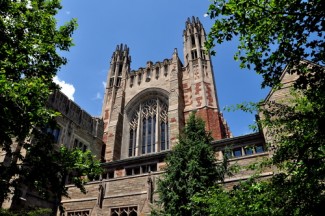Yale Law School sought 2L's apology for 'trap house' Constitution Day invitation, citing 'triggering associations'

Yale Law School. Photo from Shutterstock.
Did Yale Law School go overboard when it tried to get a 2L to apologize for sending an invitation to a to a “trap house” Constitution Day bash, held in conjunction with the Federalist Society?
Among those weighing in, the answer mostly seems to be yes, although critics see differing harms.
The Washington Free Beacon broke the story about the email invitation deemed to be “triggering” by Yale officials. The invitation was sent by a 2L who was part Cherokee and a member of the Native American Law Students Association as well as the conservative Federalist Society.
The 2L was later identified as Trent Colbert.
“Sup NALSA,” the Sept. 15 invitation read. “Hope you’re all still feeling social! This Friday at 7:30, we will be christening our very own (soon to be) world-renowned NALSA Trap House … by throwing a Constitution Day bash in collaboration with FedSoc. Planned attractions include Popeye’s chicken, basic-b- - - - American-themed snacks (like apple pie, etc.) … Hope to see you all there.”
The invitation was shared to an online forum for 2Ls, where critics focused on racist connotations associated with the term “trap house.”
The term was once associated with inner city crack dens, but it has come to mean “any place where young people can score beer,” according to the Washington Free Beacon. According to Reason’s reporting on the incident, “trap house” was frequently used in rap lyrics, but it has come to mean a “place with a fun party.” The term is also used in the name of a socialist podcast, “Chapo Trap House.”
Colbert was called into a meeting on Sept. 16 with associate dean Ellen Cosgrove and diversity director Yaseen Eldik, who said the term “trap house” connotes crack use, hip-hop and blackface, according to the Washington Free Beacon account. Eldik said the “triggering associations” were “compounded by the fried chicken reference.” Eldik also said the Federalist Society reference was triggering because of political affiliations that are oppressive to some communities. Nine students had complained, the 2L learned.
In that meeting and in a second meeting the next day, both Cosgrove and Eldik implied that Colbert could face consequences unless he apologized. Eldik even drafted an apology the 2L could use. “I know I must learn more and grow,” the draft apology said, “and I will actively educate myself so I can do better.”
Colbert secretly recorded the conversations.
He refused to apologize but said in the online forum that he would welcome conversations with anyone hurt by his words.
To Slate columnist Mark Joseph Stern, the incident bolsters the Federalist Society’s victimhood mentality, providing “grist for the grievance-industrial complex that drives the conservative legal movement.” Although Stern believes the trap house and Popeye’s chicken references “are, at a minimum, fraught” and “the email is juvenile and unprofessional,” he also believes the law school’s response was misguided.
Washington Post columnist Ruth Marcus begins her column with strong words. “Maoist reeducation camps have nothing on Yale Law School,” she writes. Marcus acknowledges an exaggeration, but she sees the incident as evidence of a “grievance culture in which every slight, real or perceived, is greeted with outsize demands for disciplinary consequences.”
Writing at Original Jurisdiction, David Lat argues the better solution would have been for the law school to have a “meet and confer” requirement in such situations. Students who were offended by the message should be required to talk things out with the offending party, he says.
“I don’t doubt that some students at Yale felt genuinely offended by the trap-house email,” Lat wrote. “But with all due respect to folks who feel differently, there’s nothing about this email that rises to the level of ‘discrimination’ or ‘harassment.’ ”
Lat spoke with Colbert over the weekend.
“I was never aware of the word ‘trap house’ having any racial connotations. I thought of a ‘trap house’ as like a frat house, just without the frat,” Colbert told Lat. “I had been calling our house the ‘NALSA trap house’ for months before this incident. I had been calling it that in messages with other NALSA board members for months, and nobody had said anything to me about it.”
Colbert also explained why he used the term “basic b- - - - foods” in the invitation. “The theme of our party was Constitution Day,” he said. “I was trying to say we’d be serving classic American foods, quintessentially American foods—sort of caricaturing ourselves as Americans on Constitution Day, this very American day. And I have a very casual tone when I write emails. So that’s why I referred to ‘basic-b- - - - -American-themed snacks.’”
Yale Law School released this statement to Lat: “Yale University and Yale Law School have strong free speech protections, and no student is investigated or sanctioned for protected speech. When the law school receives complaints about offensive communications, the dean of students routinely tries to help students talk to one another and resolve their disagreements within the community. At no time was any disciplinary investigation launched or disciplinary action taken in this matter. While any person may report concerns about a lawyer’s character and fitness to the bar, the law school has a longstanding policy of reporting only formal disciplinary action to the bar association. Any media reporting to the contrary is false.”
Updated Oct. 22 at 9:15 a.m. to clarify reference to Washington Post coverage.
Write a letter to the editor, share a story tip or update, or report an error.


